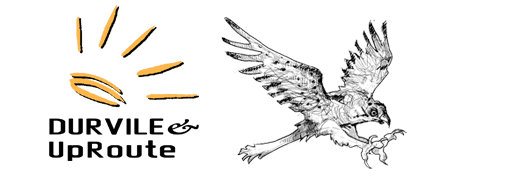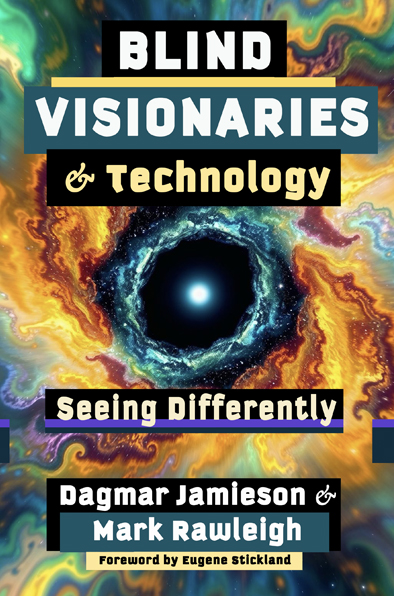You can a) Listen to this page by clicking the icon above, b) scroll down for a large type experience, or c) use your screen reader.
BBLIND VISIONARIES AND TECHNOLOGY
Seeing Differently
BY DAGMAR JAMIESON AND MARK RAWLEIGH
With Ashley King, Jonathan Sieswerda, John-Ross Rizzo PhD and Giles Hamilton-Fletcher PhD, Meghan Hargrave, Julian Hobson and others.
Foreword by Eugene Stickland MFA | Afterword by Lorene Shyba PhD
DESCRIPTION
Blind Visionaries and Technology: Seeing Differently is an in-depth exploration of how individuals with diverse visual impairments leverage technology, and especially AI, to reimagine their perceptions of the world. Central authors Dagmar Jamieson, who lost her sight due to cone-rod dystrophy, and Mark Rawleigh, diagnosed with Retinitis Pigmentosa, provide foundational narratives informed by their personal journeys, establishing context for insightful contributions from a diverse group of accomplished experts, each with unique visual impairments.
Structured as a collaborative volume, the book begins with a foreword by playwright Eugene Stickland, who discusses his experiences living with prosopagnosia (face blindness). This is followed by chapters from pioneering professionals, including Ashley King, a legally blind actor and playwright who advocates for accessibility and inclusive representation in the arts; Jonathan Sieswerda, whose congenital visual impairment drives his exploration of technology’s dual potential to empower and isolate; and Dr. John-Ross Rizzo, alongside colleague Dr. Giles Hamilton-Fletcher, whose groundbreaking research on Choroideremia and sensory substitution informs advancements in wearable assistive technology.
Additional contributions include Meaghan Hargrave, who examines the profound impact of mainstream technologies such as the iPhone on daily independence for individuals with sight loss and Julian Hobson, whose insights are shaped by colour vision deficiency, integrating medical physics, metaphysics, and artistic perspectives to explore accessibility and creative innovation.
Concluding the book is an afterword by publisher Lorene Shyba, who examines the implications of artificial intelligence in enhancing digital accessibility through innovations in alt-text generation, inclusive website design, and user navigation.
These compelling personal narratives and analytical discussions illuminate technology’s transformative potential for promoting independence, creativity, and professional advancement while critically examining both its capabilities and limitations. Blind Visionaries and Technology offers readers practical insights into implementing and advancing assistive technologies and AI, highlighting their potential to foster greater inclusivity and societal engagement.
AUTHORS INCLUDE:
Foreword Writer, Eugene Stickland
Eugene Stickland lives with prosopagnosia (face blindness), a visual impairment that makes recognizing even familiar faces challenging, though other aspects of his vision remain intact. Born in Regina, Saskatchewan, Eugene earned an MFA in Theatre, specializing in playwriting and dramaturgy, from York University. In 1994, he relocated to Calgary for Alberta Theatre Projects' premiere of his acclaimed play, "Some Assembly Required," which subsequently enjoyed over 100 productions worldwide. During his ten-year residency at ATP, Eugene authored nine additional plays, and he is also the author of No Harm Done: Three Plays About Medical Conditions, demonstrating his ongoing exploration of unique and impactful themes.
Dagmar Jamieson
Dagmar Jamieson is an artist, designer, and water skier whose passion for creativity persists despite losing her sight due to cone-rod dystrophy diagnosed at age 13. Her determination and imagination drive her innovative home designs and expressive watercolour paintings. Dagmar views blindness not as a limitation but as a gateway to extraordinary experiences. She describes water skiing as a sensory journey, guided by the rhythm of the wake, where intuition and precision replace sight. Her research and artwork have been featured in the book Ascenti: Humans Opening to AI.
Mark Rawleigh
Mark Rawleigh, diagnosed with Retinitis Pigmentosa at the age of nine, is a dedicated lifelong learner who holds Bachelor of Arts degrees in Psychology and Sociology, and is currently pursuing a post-bachelor’s certificate in Human Resource Management. Mark has never let vision loss define his limits; instead, he passionately explores the world through travel, education, and photography, studying at universities globally and immersing himself in diverse cultures, histories, and ways of life. Photography, a passion from childhood, enables Mark to capture and preserve his unique perspective, allowing him to share his adventures and inspire others to embrace life's boundless possibilities.
Ashley King
Ashley King is a Mexican-Canadian, legally blind actor, playwright, writer and accessibility consultant. Having lost her eyesight at age 19 due to methanol poisoning, she now lives with Optic Nerve Atrophy resulting in her vision loss. She is a graduate of Company of Rogues Actors’ Studio in Calgary, Alberta, having completed the Master Class actor training program. She obtained a bachelors degree in Communications majoring in Journalism and a certificate of International Communications from Mount Royal University. Throughout her artistic practice, she strives to advocate and to centre her work around equal representation, accessibility and inclusion. Through the use of technology, she is passionate about exploring the many ways we can share authentic experiences. Her writing—both past and present—focuses on personal lived experiences, striving to bridge divides and foster understanding across diverse perspectives,
Jonathan Sieswerda
Jonathan Sieswerda was born with Leber congenital amaurosis, leaving him with only peripheral vision. He channels this experience into advocacy, research, and tech-based accessibility. A Psychology major and Computer Science minor at The King’s University, he is Vice President Internal of the Students’ Association and supports both IT and research into gender identity. He works at Apple’s Genius Bar and collaborates with groups like Eviance and CNIB on disability rights and climate justice. A competitive water skier on Canada’s adaptive team, he’s training for the World Championships in Australia, using sport and technology to help build a more inclusive world.
John-Ross Rizzo MD, MSCI, FACRM
John-Ross (JR) Rizzo was diagnosed in childhood with Choroideremia, a congenital retinal disease shaping his vision and professional path. A renowned physician-scientist, he holds the Ilse Melamid Professorship in Rehabilitation Medicine at NYU Langone Medical Center, serving as its first Health System Director of Disability Inclusion and Vice Chair of Innovation and Equity at Rusk Institute. With over 150 publications, he directs the VMIL and REACTIV Laboratories, which includes pioneering assistive wearable technologies for persons with visual impairments. In 2023, Dr. Rizzo was appointed to the MTA Board by Governor Kathy Hochul, continuing his advocacy for more accessible ways to persons with disabilities to commute and traverse NYC.
Giles Hamilton-Fletcher PhD
Giles Hamilton-Fletcher is a fully sighted post-doctoral research fellow at NYU Langone Health, working with Dr. JR Rizzo. His research uses multisensory psychology to improve visual assistive technology for people who are blind or have low vision. He explores sensory interactions, including synaesthesia, cross-modal correspondences, and learning sensory substitution. Giles holds a Master’s in Functional Neuroimaging (Brunel) and a PhD in Psychology (Sussex). He was an Invited Speaker at the 2021 re:MAKING SENSE symposium and named an Emerging Vision Scientist by the Alliance for Eye and Vision Research in 2018, contributing significantly to accessibility and innovation in sensory technologies.
Meaghan Hargrave
Meaghan Hargrave, born with congenital cataracts and diagnosed with glaucoma at age 11, embraces life with resilience and passion. As the Program Lead for the CNIB Accessible Technology Program in Southern Alberta, she empowers others with sight loss to use mainstream technology for greater independence. Beyond her career, Meaghan consults on inclusive design for the City of Calgary’s Access Subdesign Committee, championing equity and accessibility for all. A lifelong athlete, she competed in goalball and enjoys downhill skiing. Today, Meaghan continues to explore the world’s beauty through biking, walking, and advocating for a more inclusive community.
Julian Hobson
Julian Hobson has protanopia, colour vision deficiency, affecting his ability to distinguish certain colours due to cone-cell impairment. A talented artist, he designed the cover background for Blind Visionaries, in colours he can discern, by blending creative prompts with innovative AI technology. Equally skilled in mainstream medicine, art, and metaphysics, Julian studied medical physics and cardiological science during his extensive career with the Royal Army Medical Corps in the British Army.Julian is also editor of Embrace Your Divine Flow and co-editor of Secrets of the Forsaken. Born in Sheffield, UK, he now lives in the Kootenays of British Columbia, exploring intersections of health, creativity, and technology.
Lorene Shyba PhD
Afterword writer Lorene Shyba is the publisher and creative director at Durvile & UpRoute and is fully sighted. Her research explores the integration of artificial intelligence in the creative industries, with a focus on publishing and digital accessibility. She was the principal researcher, alongside J.R. Parker, on Ascenti: Humans Opening to AI, a project encompassing a book, conference, and website. In the Afterword for Blind Visionaries, Lorene reflects on the relationship between AI-generated image prompts and descriptive alt-text, highlighting innovations in semantic web design and navigation to enhance the digital experience for people with low vision.
----
PREORDER THE BOOK: Indie Bookstores, Amazon, Indigo/Chapters, Barnes & Noble
Categories:
HEALTH & FITNESS / Vision
SOCIAL SCIENCE / Accessibility Inclusion Advocacy
COMPUTERS / Technology and Artificial Intelligence
ISBN: 9781990735844 (paperback)
9781990735851 (ebook)
9781990735868 (audio)
Release date: March 2026.
Individuals: Ask your bookseller or buy online.
Booksellers: Order through our sales team
We gratefully acknowledge funding through the Alberta Media Fund and the Canada Book Fund.

----
Select titles in the Reflections Series:
A Painful Duty: Forty Years at the Criminal Bar
Eyepiece: Adventures in Canadian Film and Television
Less Painful Duties: Revolution in the Legal Profession
Benched: Passion for Law Reform
Know It All: Finding the Impossible Country
From the Corner of Bad and Ass
My Life in Propaganda: Language and Totalitarian Regimes
Canada Unscripted: Icons of CBC and NFB Unfiltered
Blind Visionaries and Technology: Seeing Differently

